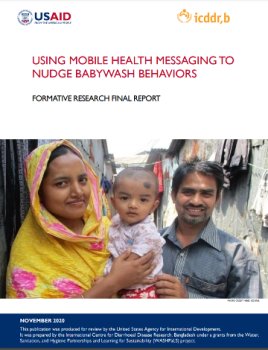Children less than five years of age are at greater risk of diarrheal diseases globally. Frequent diarrhea is associated with growth faltering and poor cognitive development, which together account for a huge global burden. Multiple risk factors have been identified for diarrheal diseases in children that include poor food hygiene practices, unsafe disposal of child feces, child mouthing of contaminated fomites, and the poor hand hygiene of caregivers of young children. Behavior change communication attempted by delivery of health information through mobile technologies (mHealth) constitutes a low-cost, reflexive, scalable approach to foment behavior change. This USAID research grant sought to answer the overall research question: Can mHealth messaging effectively nudge and sustain improved Baby Water, Sanitation, and Hygiene (BabyWASH) behaviors, forming new hygiene habits for improved infant and young children’s health and growth? The goal was to develop a scalable approach to promote safe child feces disposal, improved food hygiene, and reduced childhood mouthing of soil and contaminated fomites.
This research was conducted in urban slums of Dhaka, Bangladesh from July 2018 to March 2020. Participants included caregivers of young children (mothers, fathers, and grandparents) and government stakeholders. We developed three modules in the BabyWASH mHealth program: 1) child feces disposal behaviors, 2) child mouthing behaviors, and 3) food hygiene behaviors. The focus of the formative research conducted under this grant was on the development of intervention content for the BabyWASH mHealth modules and piloting of the developed intervention.1 The formative research and intervention development process followed the Integrated Behavioral Model for WASH (IBM-WASH) model, as well as System 1 and System 2 drivers of basic habit science and “nudging theory.” Formative research activities included three components: (1) exploratory interviews, (2) intervention development through mHealth workshops, and (3) pilot studies of the BabyWASH mHealth modules. The BabyWASH mHealth program was delivered by mobile and voice messages using the Viamo platform. The developed mHealth modules were tested over the course of four iterative phases of a pilot study and evaluated through a mixed-methods approach that included semi-structured interviews, group discussions, unannounced spot checks, and structured household observations.
This research was conducted as part of a grant under the USAID Water, Sanitation, and Hygiene Partnerships and Learning for Sustainability (WASHPaLS) Project.


